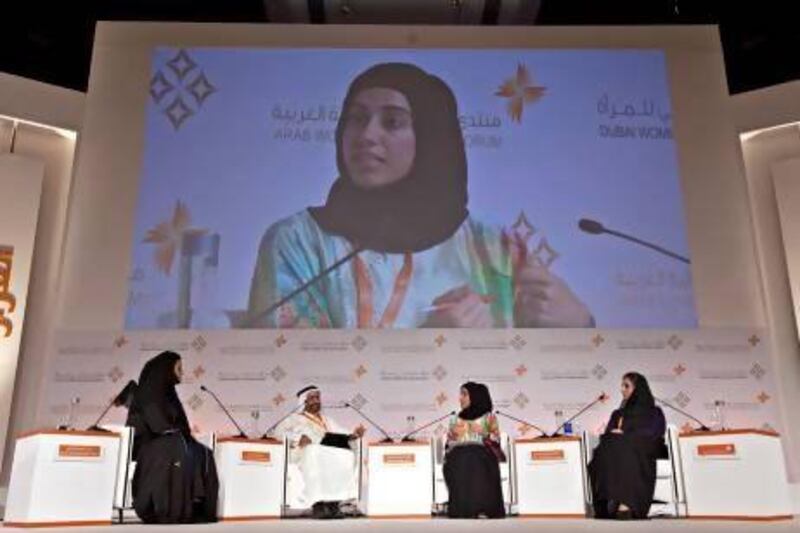DUBAI // Government quotas are not always the best way to empower businesswomen. Instead, women need more training and networking - plus personal ambition - to reach the corporate boardroom, speakers told the Arab Women Leadership Forum.
"Women should advocate for themselves," said Maryam Al Suwaidi, deputy CEO for licensing, supervision and enforcement at the Securities & Commodities Authority.
The conference, hosted by the Dubai Women Establishment on Monday and Tuesday, focused on increasing diversity on corporate boards.
Women bring different perspectives that can strengthen companies, the speakers said. But women hold only 1.5 per cent of board positions at listed companies in the Gulf Cooperation Council, according to research by Hawkamah, a Dubai think tank. In Abu Dhabi, the figure falls to less than 1 per cent, said Nick Nadal, head of Hawkamah.
In an audience poll at the conference, nearly a quarter of voters said the issue was due to "male culture" and the fact that "women have poor networks."
The problem cannot be left to the private sector to sort out, some speakers said.
"If you leave it completely to the market, this thing is just going to perpetuate itself," said Mak Yuen Teen, associate professor at National University of Singapore's business school.
Latifa Al Bimany, a specialist at the Oman Centre for Corporate Governance, said: "Board members will always look for someone who's similar to them. Similar talents, similar experiences, similar golf clubs. And in the end, you'll find more men selecting men."
Several European countries have set quotas to address the issue; Norway requires that women make up 40 per cent of boards at publicly listed companies.
Speakers discouraged the idea of quotas in the UAE, though.
"It's a free country and a free economy," Ms Al Suwaidi said, on the sidelines of the conference.
"Harsh measures" such as quotas must be considered carefully, said Aisha Abdulla Miran, assistant secretary general of the Dubai Executive Council's strategy management and governance sector.
She questioned whether quotas could lead companies to make superficial efforts.
When the audience was asked how to solve the problem, half of voters said women should be empowered through either executive education or professional development. Just 14 per cent said the government should set gender balance targets.
"We must start from the bottom up," Ms Miran said.
Traditions can create "mental barriers" for women, said Ameera Binkaram, chairwoman of the Sharjah Business Women Council. She encouraged women to learn to tout their own achievements.
Mr Nadal asked whether the local tradition of discussing the issues of the day in a majlis could limit women's ability to network.
"The rulers, patriarchs, actually have events, typically mostly for men," he said.
Ms Miran said that the role of the majlis is evolving, though.
"I personally have witnessed events that have been hosted under the majlis concept where his Highness [Sheikh Mohammed bin Rashid, Ruler of Dubai] invited both genders, men and women to come and share ideas," she said.
Women can attend a majlis if they are willing to push past the mental barrier, Ms Miran said: "It is about women going out of their comfort zone, and how comfortable they feel in a male-dominated environment."
At the end of the discussion, the audience member Zahayya Maghrabi, 64, urged women to remember the generations that came before.
"We don't have any majlises for women," Ms Maghrabi said of her experience in Jeddah.
"I came to the forum, and I found that in Dubai you have all categories of women's associations, but you have left and forgot any women in retirement."
"I have something to give," Ms Maghrabi told the auditorium of young women. "I'm not coming just to discuss. So, inshallah, I would like to play a role."
Editorial, page a15






